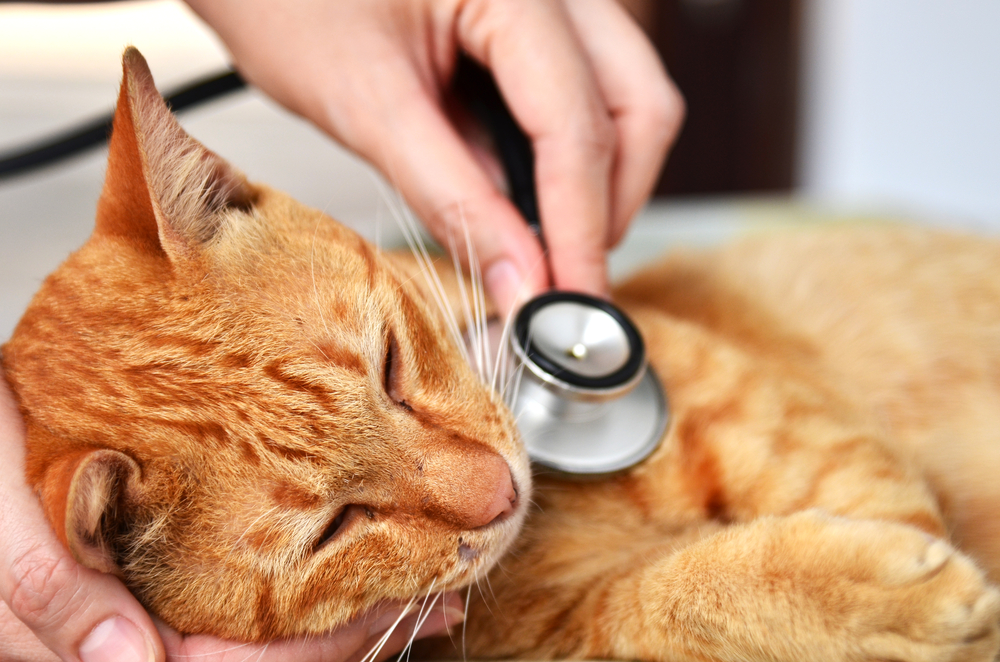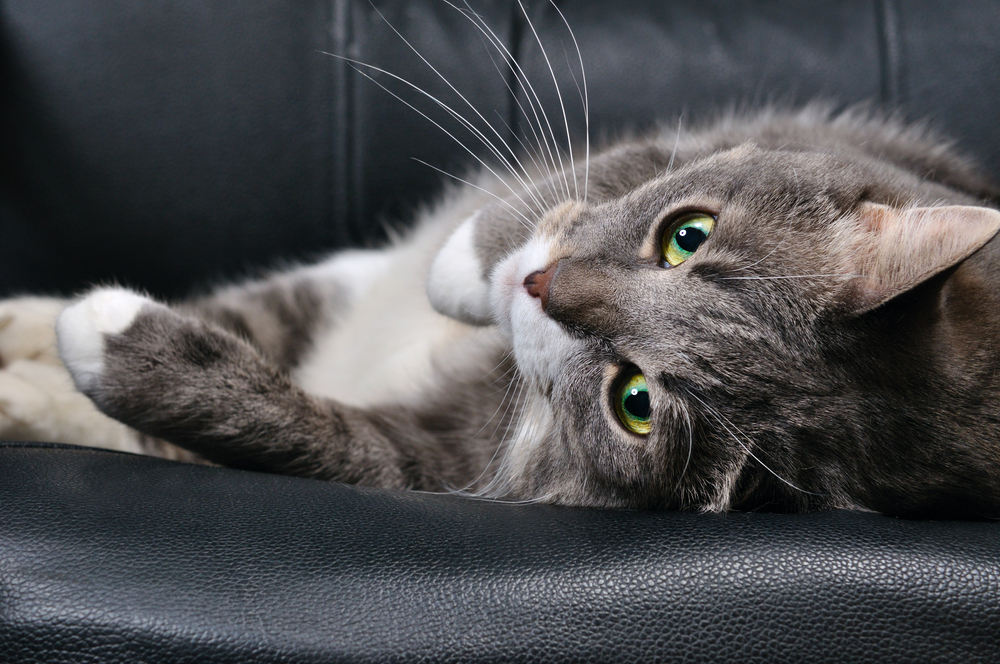

Has your cat been socialised with children? And, if so, what about with babies? Kids are like aliens to cats - they flail about, scream in a high-pitched voice and are unpredictable at best in what they’ll do next. It takes some serious getting used to that before the cat can comfortably consider that kind of situation as normal.
So, take a moment to consider the personality and background of your kitty. Did they grow up around kids? Do you have kids over regularly through friends or family? And how does the cat deal with their presence? For that matter, what kind of relationship would you like your cat to have with your child?
Next to consider is how much of the territory your cat lives in is going to change. This is especially important for indoor cats who live between those walls all day. Does your cat already stress or start vocalising when you buy a new piece of furniture? How is it going to react to all the new things your baby will need - especially if they’re brought in all at once?
Lastly, consider your own routines and your relationship with your cat. You’ll likely have very little extra time once the baby arrives and it will be easy to be swamped, overwhelmed and focused on what needs doing to take care of the new baby. And who can blame you. The thing is, your cat might get confused as to why your dynamic has suddenly changed - why you no longer have the energy to play, to cuddle and get their share of the attention. Depending on the relationship you have with them, you might want to consciously put aside some time to maintain it.

The sound a baby makes is…well, let’s call it unique. It can also be quite distressing to someone whose most fine-tuned sense is hearing - especially if that someone doesn’t even understand where it comes from or what it is. With that in mind, the best thing to do is to invite over some friends who just had a baby and who don’t mind that the cat actually checks their child out if they want. Keep some treats for the food-motivated kitties or some cuddles for the attention-motivated kitties ready to create at least reassuring, if not positive associations with the sound. Build this up gradually over time, until you see them visibly being comfortable and relaxed. Even if the child doesn't cry while at your place, their presence and the opportunity to check it out will be highly beneficial.
You can also do this with YouTube videos or specific baby-sound cds. It’s less ideal as they cannot check out the source, but the training will work regardless and teach them that the sound doesn’t mean danger, or shouldn’t be distressing to them in any way. A combination of both techniques is likely to give the best result.
See if you can bring in the baby furniture you will need one item at once. This is especially important if you have a cat who gets easily stressed and confused when you bring in new things. Let them be there when it gets moved in and give them ample space later on to check it out and get used to it. Spray it with Feliway to help the transition along. And if you do paint and redecorate the nursery, use some Feliway in all the corners as well.
If it cannot be avoided to have everything come at once, put the cat away when the stuff gets moved in, put it all in place, plug in a Feliway vaporiser and let them check it out at their own pace after.
Think about whether or not you want to have the cat in the nursery after the baby is born. While it is recommended to have them check out the nursery after the transformation has been completed, some parents prefer not to let the cat into the nursery as cats tend to like soft baby things. Some will make the crib their new home if given the chance, for instance. If you do decide to restrict their access, get them used to this beforehand. After they’re comfortable with the new room, and show no longer a specific interest in it, start closing the door so they get used to it not being accessible to them.
And please keep in mind that restricting territory, especially in a multi-cat household where territory might already be scarce will increase stress levels, so try to compensate with vertical territory or outdoor territory. And the cat that might’ve called that room theirs previously, will suddenly need to re-home which will cause a bunch of renegotiating with regards to who gets to use what at which time.
There is a nasty rumour floating around that one should get rid of their cats when pregnant. This is a lie. While there is a rather small chance that your cat is infected with toxoplasmosis and can therefore pass it on to you , it can be managed easily by having your partner take care of the litter box. Less ideal is using gloves, but it works just the same. Wash your hands thoroughly afterwards and you should be fine - there is no reason to give up your beloved pet during this precious stage of your life.
When you bring home the baby, your entire family will go through a big adjustment - including your cat(s). Try to include them in this joyous occasion. Remember, they don’t know what’s going on. Introduce them to the child and let them sniff things to get used to the baby’s presence. They might hiss, or they might be curious - allow them to respond the way they have to to process the situation.
Encourage them to check out the baby’s things - while watching them as they might spray if they feel overwhelmed and insecure - and pet them, even bribe them with treats to enjoy the experience. Use the Feliway spray on the items or a vaporiser for the room if they seem particularly distressed by the diaper bag or other items that leave the house frequently to make it easier on them, initially.
Try to consciously take a moment from time to time to check up how your kitty is coping with the new addition and give them some additional attention or play-time if they seem like they're struggling. You'll know when they've fully adjusted by the fact that they've returned to their previous routines.
 It is possible that if the cat wasn’t properly prepared or hits chronic stress level regardless, they may act out. Common is incontinence due to chronic stress, though destruction of property - especially when lacking the play time or attention that they used to get from their owners - is possible as well in an effort to expend their energy elsewhere. With proper prep though, the risks for these issues should be minimised significantly.
It is possible that if the cat wasn’t properly prepared or hits chronic stress level regardless, they may act out. Common is incontinence due to chronic stress, though destruction of property - especially when lacking the play time or attention that they used to get from their owners - is possible as well in an effort to expend their energy elsewhere. With proper prep though, the risks for these issues should be minimised significantly.
If you are already in this situation right now, start with a vet check to see if medically they are all right. After that, use the tips within this article to help release the pressure. Institute 10 minutes of play-time with the cat on a daily basis to give them a chance to vent if at all possible, using a fishing rod toy or ribbon, plug in a Feliway and most importantly, re-introduce them to your child. Do not keep them away from it - bribe them into liking each other! The more you keep things hidden and separate, the bigger the fear of the loud screaming mystery will be - and the more stress it will cause. If you feel like you’re drowning, do not be afraid to get help and sort this out as quickly as possible for all your sakes as this is a time where you're especially stretched thinly.
In essence, it comes down to the following:
Introduce your family - furry and non-furry - to each other without instilling fear or letting your worries get the better of you. You know your cat better than anyone - trust that they will love your child the way they love you as their owner, given time. And give them the help they need to come to terms with the life-altering changes around them, so they can be there for you in the stressful yet wondrous months to come.
 Why a Siamese Cat Will Always be My Best Friend
A Siamese cat will let you be their best friend.But the
Why a Siamese Cat Will Always be My Best Friend
A Siamese cat will let you be their best friend.But the
 Inflammation of the Middle and Inner Ear in Cats
Otitis Media and Otitis Interna in Cats
Ot
Inflammation of the Middle and Inner Ear in Cats
Otitis Media and Otitis Interna in Cats
Ot
 High Blood Sugar in Cats
Hyperglycemia in Cats
The term hyperglycemia refe
High Blood Sugar in Cats
Hyperglycemia in Cats
The term hyperglycemia refe
 Dietary Reactions in Cats
Gastrointestinal Food Reactions in Cats
Gastroint
Dietary Reactions in Cats
Gastrointestinal Food Reactions in Cats
Gastroint
 Colonic or Rectal Inflammation in Cats
Colitis and Proctitis in Cats
Histiocytic ulcerat
Colonic or Rectal Inflammation in Cats
Colitis and Proctitis in Cats
Histiocytic ulcerat
Copyright © 2005-2016 Pet Information All Rights Reserved
Contact us: www162date@outlook.com